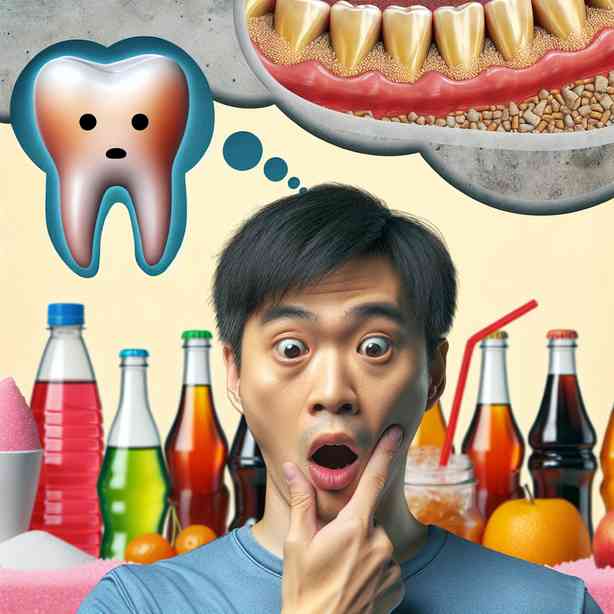
Dental enamel, the hard, outer layer of your teeth, plays a vital role in safeguarding your teeth from decay and damage. Unfortunately, many individuals engage in habits that unknowingly harm their enamel. In this article, we will delve into some common practices that could be undermining the integrity of your enamel, the implications of these habits, and how you can protect your dental health.
Firstly, let’s address a common misconception regarding oral hygiene. Many people believe that brushing their teeth immediately after consuming acidic foods or beverages, such as citrus fruits or soda, is beneficial for their dental health. However, this practice can be detrimental to your enamel. When you consume acidic substances, your enamel becomes temporarily softened, making it more vulnerable to wear. Brushing your teeth right away can strip away this softened enamel, leading to increased erosion over time. Instead, it’s advisable to wait at least 30 minutes before brushing, allowing your saliva to neutralize the acid and re-harden the enamel.
Furthermore, while maintaining oral hygiene is crucial, over-brushing can also be harmful. Many people think that brushing harder or more frequently will result in cleaner teeth, but this isn’t the case. Over-brushing can lead to abrasion and wear on the enamel, particularly along the gum line where the enamel is thinnest. It’s essential to use a soft-bristled toothbrush and apply gentle pressure when brushing. Additionally, you should aim to brush for at least two minutes, twice a day, but avoid excessive force.
Another factor that can silently damage your enamel is the consumption of highly sugary foods and drinks. Sugars serve as an energy source for bacteria that produce acid as a byproduct of their metabolism. This acid can attack the enamel and result in cavities. It’s crucial to maintain a balanced diet, limit sugary snacks and beverages, and rinse your mouth with water after consuming sugar-laden foods to help mitigate the effects of acid production.
Next, we should consider the role of carbonated beverages in enamel erosion. Many people enjoy soda or sparkling water as a refreshing drink, but the carbonation in these beverages often comes with added acids that can contribute to enamel wear. Regular consumption of these drinks can gradually erode the enamel, leading to increased sensitivity and a greater risk of cavities. If you choose to indulge in carbonated beverages, it’s best to do so in moderation and rinse your mouth with water afterward to help neutralize the acids.
Another habit that may be contributing to enamel damage is grinding your teeth, also known as bruxism. Many individuals are unaware that they grind or clench their teeth, often during sleep due to stress or anxiety. This constant pressure can result in significant wear on the enamel, leading to cracks or chips. If you suspect that you grind your teeth, consult with your dentist. They may recommend a mouthguard to protect your teeth during sleep or suggest stress-relief techniques.
Additionally, it’s important to be mindful of at-home whitening techniques and products. While striving for a brighter smile is a common goal, some whitening agents can be highly abrasive and potentially harmful to your enamel. Products containing strong acids or aggressive scrubs can lead to enamel erosion over time. It is advisable to consult with a dental professional before starting any whitening regimen, ensuring the products you choose are safe and effective for your enamel.
Moreover, some individuals might not realize that certain health conditions can also contribute to enamel erosion. Gastroesophageal reflux disease (GERD), for instance, can cause stomach acids to flow back into the mouth, leading to enamel damage. If you experience frequent heartburn or acid reflux, consulting your healthcare provider is crucial. Managing the condition can help minimize acid contact with your teeth and protect your enamel.
Further, it’s essential to recognize the effects of chronic dry mouth, a condition that can occur from various medications, medical conditions, or dehydration. Saliva plays an essential role in protecting enamel by neutralizing acids and washing away food particles. When saliva production diminishes, the enamel may become more susceptible to erosion. Staying hydrated and discussing dry mouth with your doctor can help manage this condition effectively.
In addition to these habits, certain lifestyle choices can also impact your enamel health. Smoking and using tobacco products are known to stain teeth, but they can also contribute to enamel erosion and other oral health issues. The harmful chemicals in tobacco can weaken the enamel and exacerbate existing dental problems. Quitting smoking can significantly benefit not just your teeth, but your overall well-being.
Regular dental check-ups are vital for maintaining oral health and identifying potential issues early on. Your dentist can help monitor enamel wear and provide personalized recommendations based on your dental health and habits. Professional cleanings can remove plaque and tartar buildup, which may contribute to acid erosion, and your dentist can also offer tailored solutions to protect your enamel.
Implementing a proper oral care routine is critical for enamel protection. Use fluoride toothpaste, as fluoride strengthens enamel and helps to remineralize it after acid attacks. Additionally, consider using a fluoride mouthwash for extra protection. Eating foods rich in calcium and phosphates, such as dairy products, leafy greens, and nuts, can also help support enamel health by providing essential nutrients for remineralization.
In conclusion, many habits that may seem innocuous can significantly affect the health of your enamel. Understanding these behaviors and making mindful adjustments to your daily routine can help protect your teeth and enhance your overall dental health. By practicing proper oral hygiene, making dietary adjustments, and consulting with your dental care provider, you can maintain your enamel’s integrity and enjoy a healthy, radiant smile for years to come. Always remember that prevention is better than cure, and taking proactive steps today will pay off in the long run. Ensuring you are informed and aware of these potential threats to your enamel will empower you to maintain not just your dental health but your overall well-being.


